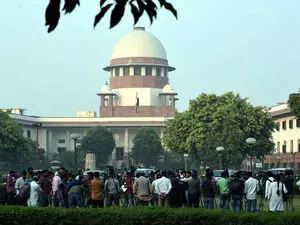Guv must return Bill to Assembly if withholding assent: SC

New Delhi: The Supreme Court has said that if a Governor decides to withhold assent to a Bill, then he has to return the Bill to the legislature for reconsideration.
This clarification by the court is important because Article 200 of the Constitution does not expressly state what should be the next course of action after a Governor withholds assent for a Bill.
“If the governor decides to withhold assent under the substantive part of Article 200, the logical course of action is to pursue the course indicated in the first proviso of remitting the Bill to the state legislature for reconsideration.
“In other words, the power to withhold assent under the substantive part of Article 200 must be read together with the consequential course of action to be adopted,” it said.
According to Article 200, three courses of action are open to the Governor - grant assent, withhold assent or reserve the bill for President’s consideration.
There was an ambiguity as to whether the Governor is bound to return the bill to the Assembly if he is declaring that he is withholding assent. This situation arose recently in Tamil Nadu, where the Governor declared that he was withholding assent over certain Bills.The Governor did not return those Bills to the house; yet, the Assembly readopted the very same Bills.
The clarification was given by the top court in its November 10 judgement, which was uploaded on Thursday night. It was to decide on the plea of the AAP government in Punjab that alleged the Governor was not granting his assent to four Bills which were passed by the Assembly.
The Supreme Court has directed Punjab Governor Banwarilal Purohit to decide on the Bills passed by the legislative Assembly during its “constitutionally valid” session held on June 19 and 20, saying the Governor’s power cannot be used to “thwart the normal course of lawmaking”.
The top court, in its November 10 judgement which was uploaded on Thursday night, decided on the plea of the AAP government in Punjab which alleged the Governor was not granting his assent to four Bills which were passed by the Assembly.
The Punjab government had also sought a judicial declaration that the Assembly session held on June 19 and 20 was “legal and that the business transacted by the House is valid”.
A bench comprising Chief Justice of India D Y Chandrachud, Justice J B Pardiwala and Justice Manoj Misra, in the 27-page judgement, held the Assembly sessions were valid and this aspect was not open to the governor after the Speaker took the decision.
The judgement stated, “The Governor, as an unelected Head of the State, is entrusted with certain constitutional powers. However, this power cannot be used to thwart the normal course of lawmaking by the state legislatures.”
Casting doubt on the validity of the session of the House is not a constitutional option open to the governor, it said, adding the legislative Assembly comprises duly elected MLAs and is governed by the decisions taken by the
speaker.



